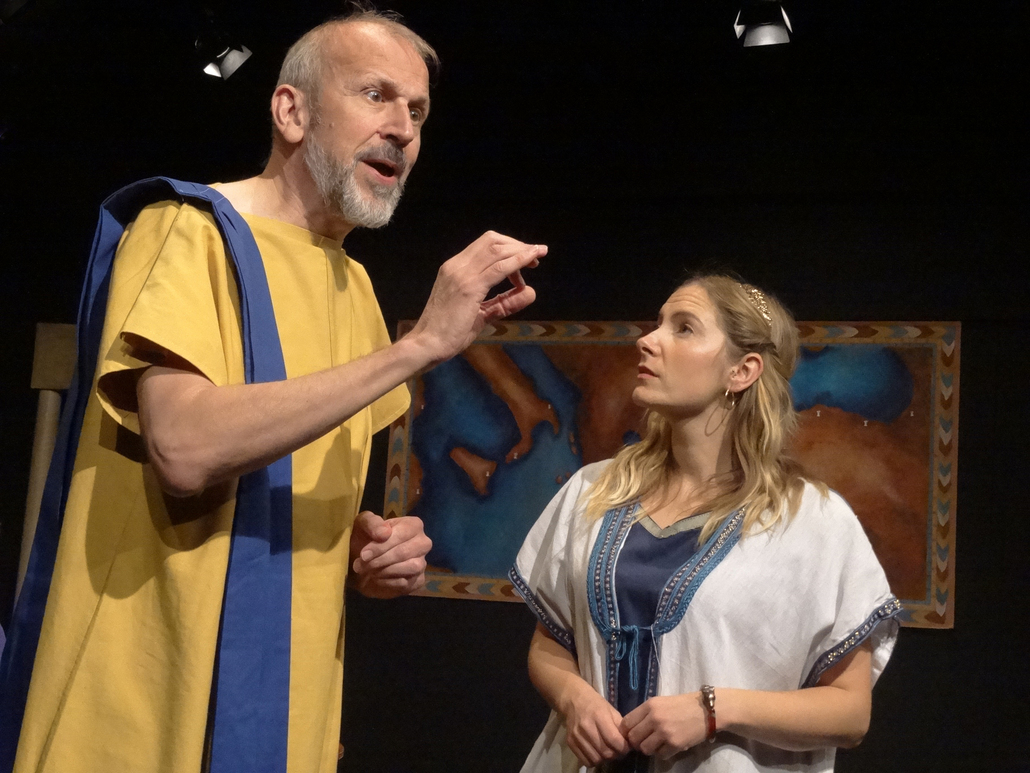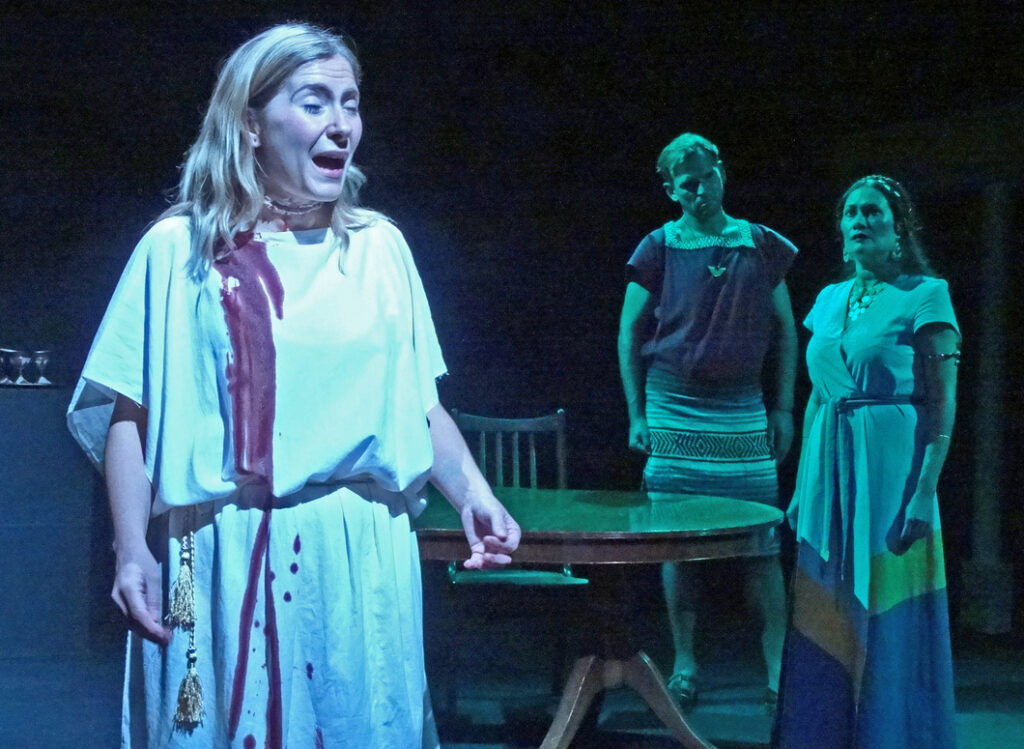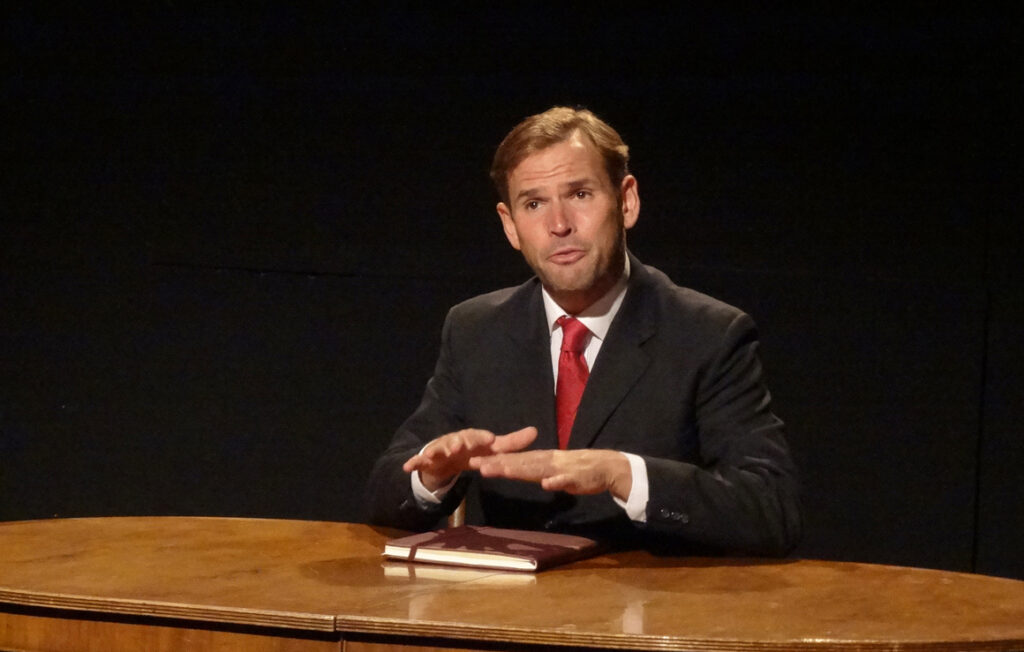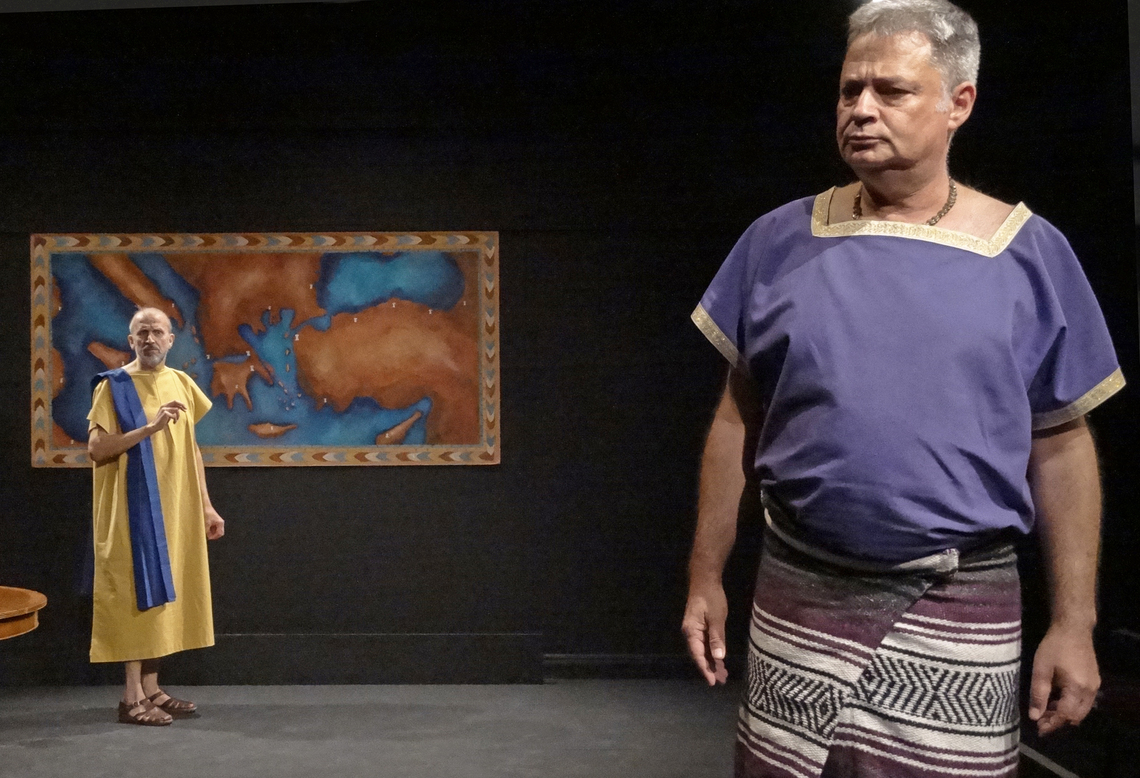Review by Simon Jenner, October 3 2025
★ ★ ★ ★
A New Venture Double, with the shorter work by Simon Stephens first, at 40 minutes. However Simon Stephens’ agents placed an embargo on any reviewing of Sea Wall save locally. My ‘local’ review of that exceptional production can be found on a link at the botttom of the page. Following that the premiere of debut playwright Strat Mastoris, whose works as lighting designer and photographer is known at New Venture Theatre and occasionally venues around Brighton. Mastoris’s work is an 80-minute plunge into turning the foundations of Western Literature on its head. No pressure for a first play then. Both play till October 11.
A debut play upends everything we know about Homer’s two masterpieces. Directed too by Strat Mastoris, with assistant director Carrie Hynds, it’s an expansion of a play first performed at the Lantern in February 2024. That took 25 minutes, and yet with virtually no expansion of text it’s here drawn out to 52. It still compels and there’s less of the inevitable rattle of that try-out production. Though pace throughout could be swifter it never drops in energy. There are now two new additional solo scenes. And an even greater level of deception. What Mastoris has planted is doubt substituting the planned abduction of Helen over her perceived elopement.

Jeremy Crow and Joanna-Joy Salter. Photo Credit: Strat Mastoris
Mycenae. Jeremy Crow’s Treasurer wrings his hands, metaphorically, always peregrine to his desked superior. That is, when the latter’s still. There’s a strikingly executed Mycenaean map drawn by Judith Berrill, in orange-brown and blue. It’s made to look very much as if the Greeks drew it, with recognizable if vague approximations to the actual Middle East.
Lyndon-Johnson-style-bullying Agamemnon (Mark Lester) jumps from his presidential desk and brings in his 15-year-daughter. Abruptly he asks “Are you bleeding yet?” Crow havers around Lester’s bullish deliveries, and liberal expletives: always a shock, someone observes, when phrased by classical period types.
Agamemnon wants war with Troy, who service the Greeks’ trade route by replenishing their ships, but are demanding more tax. Two in nine?? But they’re allies. Crow’s superbly havering Treasurer hesitates dislike; though cowed by Lester’s Trumpian bully. Doubtless this Agamemnon would date his daughter if he could. Crow though somehow draws us to the wrinkled conscience of the Treasurer, and with small cocks of the head insinuates it’s bad for the balance-sheet. Lester roars, purrs, roars.
Parallels with 2003’s WMD were neatly etched in this first scene, but in this new expanded version these are underscored. An erstwhile ally, trade routes and trade itself needs an excuse. Mastoris, steeped in the Iliad and Odyssey, finds an ingeniously stark new reading
Call for Odysseus (Rich Watkins), whom Agamemnon thinks is shirking a stratagem for causing war. But he hasn’t, as Watkins insinuates. Why is it the youthful Watkins keeps reminding us of latter-day politicians? One in particular. Odysseus proposes, the Treasurer hastily modifies, and Helen (Kasha Goodenough) is called for.
Goodenough makes much use of Helen’s outrage, knowing there’s only one outcome. It’s a fine speech, with Goodenough often speaking downstage. Perhaps a little more blocking might shade it, as Goodenough does by turning her gaze. Mastoris departing from Homer draws a compelling world of women and others weaponised as pawns, excuses and mass destruction.
Iphigenia (Joanna-Joy Salter) is first appalled to discover realpolitik: the fate of those woman outside, weaving cloth. Their menfolk butchered, they’re slaves. But she also has the last word. In a quietly blistering epilogue she narrates her own fate. If you know Homer you won’t be surprised to find she’s as garbed as she now is.

Joanna-Joy Salter, Rich Watkins and Kasha Goodenough. Photo Credit: Strat Mastoris
It’s a restrained but classy set. There’s a couple of pillars to emphasise a classic Ionian exit. Mastoris has supplied six items of Greek music (iterated below) much of which is over 2,000 years old or based on that material. Costume-makers Karen Hindmarsh and Jackie Jones have garbed the men in tartans as were worn; the Treasurers’ flow best of all, with two stripes of cloth denoting the passage of years. The women are similarly drawn in simple or embroidered classical lines.
This was already a first-rate piece of reinvention. It’s original, uses its sources knowingly to draw parallels with other excuses for war, and impresses with both characterisation and dramaturgy.
Only now there’s two further scenes. Crow returns and in a masterful monologue gives the performance of his career so far. It’s twelve years later. Much has happened and Crow relates – and relishes – it. Perhaps elements might be trimmed. We learn of Iphigenia’s fate twice and it might be foreshortened. Crow paints with a squirrel brush the eyebrows of lightest irony as he tells of lost Odysseus; whom everyone but Penelope thinks dead, of homecomings and fates. And a change of monarchs.
Mastoris cleverly picks up the original deception as a DNA that percolates through the Trojan Horse and Agamemnon’s fate. The Treasurer blandly assumes Helen magnificently faked it ten years with handsome Paris; we don’t hear her perspective. Similarly the Treasurer narrates what happened to those trade routes after Troy was no longer there. Fresh ironies and deceptions open up. Again Mastoris’ originality and ability to draw new parallels with his earlier material shows his invention’s unflagging; and how he might yet even further intensify his impact.
It lasts around 16 minutes. It’s then capped by Watkins returning in a modern suit; who’s in his element as Blair giving various pieces of verbatim from 2002-04. Sabrina Giles’ lighting is neat and snappy here, so we’re treated to displays of Blair sometimes shirted, sometimes formal gyrating over the desk as he squirms self-delusion and justification. It’s another tour-de-force over ten minutes.
The only caveat is a sequentially predictable drama that makes explicit what was implicit. I want less Blair, more Mastoris. A creative integration might involve Crow moved somewhere (Sparta?) where much of the Treasurer’s telling can be interrogated by Helen herself. And since Blair is Odysseus he might here come in and let the Treasurer doubletake the old fox’s new suits. And new tricks. This is a bit of effrontery from this writer; but Mastoris has already proved a masterly reinventor of classical literature. He immediately thought of Blair’s latest gambits. This classicising is a vein he will surely explore again. Meanwhile, there’s something extraordinary to hew from those latter two scenes.
Music for W. M.D
Ancient Pandura – Marios Podaras plays ‘Ay Giz’ Melody
Ancient Lyre Frist Delphic Hymn to apollo – Thanasis Kleopas & Louakiani Papadaki
Phantoms of Mycenae (Ancient Greek Lyre Music) – Leondros Coriltauvorum
Ancient Cross-Flute (Plagiaulos) – Improvisation by Yannis Pantazis
Ancient Pandura– Marios Podaras plays ‘Omni’ Melody
Orpheus’s Lyre : Lament for Solo Lyre in the just intonation of Antiquity – Michael Levy
Production Manager Tamsin Mastoris Stage Manager Moon Birglind ASMS Claudia Ezreelan, Natalie Sacks-Hammond.
Lighting Design Sabrina Giles. Lighting Rigging Sabrina Giles, Alex Epps
Sound Design Chris Dent, Strat Mastoris Sound Operation Chris Dent, Arun S Varghese, Set Build Simon Glazier, Dan Tranter, Chris Tew
Costume Karen Hindmarsh, Jackie Jones, Dressers Karen Hindmarsh, Anna Chandorkar, Lulu Belle Harrington, Angela Reinhold, Hair & Special Effects Make-up Samantha Howard
Poster Strat Mastoris, Programme Tamsin Mastoris, Photography Strat Mastoris, Elysa Hyde, Headsots Celia Stromsholm, Marketing & Publicity Elysa Hyde, Health and Safety Ian Black.
Thanks to Judith Berrill for the map, and Tapi Carpets of Hove for the Pillars, to Box Office and FOH and all at NVT.
Sea Wall/W. M. D.
Rich Watkins. Photo Credit:Giacomo Gianelli



